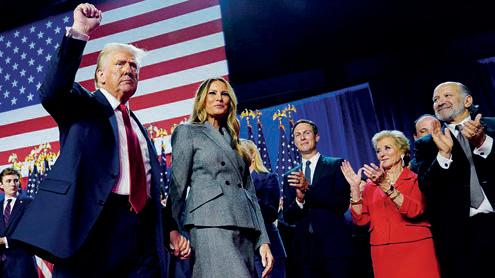The economic consequences of Trump's Presidency: A global perspective

The role of inflation in electoral outcomes is not a new phenomenon; inflation has long influenced US presidential elections, often resulting in the ruling party's defeat. Several US presidents in history have lost elections due to the economic impact of inflation.
The 1970s serve as a historical example of how inflation can shape electoral outcomes. The US economy during this period struggled with soaring inflation due to the oil embargo, which led to economic turmoil and the downfall of three Presidents: Richard Nixon, Gerald Ford, and Jimmy Carter. Nixon's administration tried to address inflation with wage and price controls, but these measures were largely ineffective. Gerald Ford, who succeeded Nixon, also faced a struggling economy, despite his "WIN" (Whip Inflation Now) campaign aimed at reducing inflation. Similarly, Jimmy Carter's efforts to curb inflation with monetary policies failed to prevent his defeat in the 1980 presidential election. Inflation played a significant role in shaping public sentiment and undermining the credibility of these presidents' economic management.
In contrast, President Ronald Reagan's policies in the 1980s were successful in curbing inflation, largely due to the efforts of US Federal Reserve Chairman Paul Volcker. Reagan's ability to control inflation while stimulating economic growth helped him win a second term. His economic strategies, including tax cuts and deregulation, played a central role in his re-election and had a lasting impact on the US economy. Reagan's presidency is often viewed as a model for effective economic management.
This story is from the {{IssueName}} edition of {{MagazineName}}.
Start your 7-day Magzter GOLD free trial to access thousands of curated premium stories, and 9,500+ magazines and newspapers.
Already a subscriber ? Sign In
This story is from the {{IssueName}} edition of {{MagazineName}}.
Start your 7-day Magzter GOLD free trial to access thousands of curated premium stories, and 9,500+ magazines and newspapers.
Already a subscriber? Sign In

Dharma Yuddha in the Age of Drones: Operation Sindoor as India's Modern Mahabharata
On April 22, 2025, the emerald meadows of Pahalgam— once alive with the laughter of tourists— fell into a haunting silence, disrupted by the sharp echoes of gunfire.
Provisional estimate of Real GDP records 6.5% growth in FY 2024-25
India's gross domestic product (GDP) grew by 6.5% in the financial year (FY) 2024-25, according to provisional estimates.

A Call for Cheque Out?
In 1987, Australian tennis player Pat Cash triumphed at Wimbledon, defeating Ivan Lendl of Czechoslovakia in the final.

RUSKIN BOND: THE GENTLE VOICE OF THE HILLS
In the quiet, mist-draped lanes of Mussoorie, where pine trees murmur secrets and the mountains echo with birdsong, resides a man whose words have touched millions— Ruskin Bond.

Economic disparities among Indian states widens amidst growing GDP
Whenever there is great prosperity, there is great inequality,” observed Adam Smith, known as the father of modern economics.

Power Hungry Al and Economic Growth
Artificial Intelligence (AI) has emerged as a key driver of economic growth and productivity. Its rapid advancement presents both unprecedented opportunities and complex challenges.
State-Sponsored Terrorism and Pakistan:Will the financial action task force, established by the G7, take notice?
On May 9, the IMF Board of Executive Directors made two key decisions, dismissing India's objections:
Rising inequality in economic development among Indian states
The inequality in economic development among Indian states is a striking feature in the country's economic history.

INNSBRUCK IN VOGUE
Imust confess—I was feeling a little light-headed. And with good reason.
Bharat Dynamics Ltd
Bharat Dynamics Limited (BDL) is one of the Indian manufacturers of ammunition and rocket systems.
